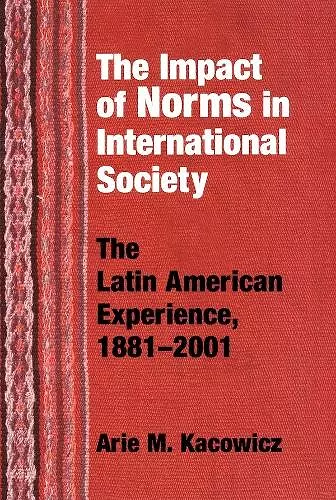Impact of Norms in International Society
The Latin American Experience, 1881–2001
Format:Hardback
Publisher:University of Notre Dame Press
Published:1st Jun '05
Currently unavailable, and unfortunately no date known when it will be back

This book addresses problems and puzzles associated with identifying international norms and the influence of these norms on the behavior of different states in international relations in a regional context. Arie M. Kacowicz’s research traces several international norms of peace and security and examines their impact in Latin America between 1881 and 2001. He offers an original synthesis of positivist and constructivist approaches and links international relations, international law, international ethics, and Latin American diplomatic history.
Kacowicz’s primary argument is that a body of international norms of peace and security can be considered an independent and dynamic factor that affects the quality of international society generally and also plays a significant role in regional contexts. In developing his argument, he analyzes the origin of international norms, the impact of norms on the domestic and foreign behavior of states, and the conditions under which regional norms affect the political behavior of states.
The book contains eleven empirical case-studies of the ways that international norms have affected the actions of Latin American states, ranging from the neutralization of the Magellan Straits in 1881, to the recent incorporation of Argentina, Chile, and Brazil into the Tlatelolco regime of a nuclear-weapons-free-zone in 1994, and the nuclear cooperation between Argentina and Brazil beginning in the late 1990s. These case-studies include stories of success through peaceful resolutions of conflict between states, of failure, and mixtures of both. Scholars and students of international relations and Latin America will find this book to be both a valuable analysis of international norms and a compelling diplomatic history
“A welcome contribution to the growing body of knowledge produced by scholars working at the intersection of international and domestic politics . . . The strengths of this book are many . . . the framework for studying international norms is excellent . . . the case studies are well executed and provide a wealth of valuable information to the reader . . . This is a fine book that deserves serious attention from scholars and policy makers alike.” - Political Science Quarterly
“Arie Kacowicz addresses the ongoing 'norms debates' in the international relations literature and attempts a synthetic perspective on norms. The attempt at synthesis is an important one and well done . . . the work is useful and significant in advancing the debate and our understanding of norms.” —Perspectives on Politics
"Kacowicz examines the role of international norms in accounting for Latin America's relatively benign international relations . . . At a general level, Kacowicz sees international norms at work in Latin American states' frequent use of third-party arbitration to resolve disputes and in numerous peaceful cessions and exchanges of territory over the years. He also assesses the impact of norms in 11 specific case studies involving territorial and other 'security' conflicts between Latin American states from the 1880s to present." —Journal of Peace Research
"Kacowicz (Hebrew Univ. of Jerusalem) examines how Latin America has regularly avoided major sources of conflict within the region. Specifically, the author attempts to broaden the theoretical foundations of international relations by analyzing the norms of peace and security affecting the quality of the Latin American international society. ...important and noteworthy contributions. With clearly written chapters that center on the theoretical features of international norms and carefully researched chapters that empirically examine Latin America, the book is suitable for graduate-level courses in international relations, comparative politics, or Latin American issues. Highly recommended."—Choice
"This is a serious book by an intellectually mature scholar. The book is written with great clarity and will make an original contribution to the field." –Michael Francis, University of Notre Dame
ISBN: 9780268033064
Dimensions: 229mm x 152mm x 14mm
Weight: unknown
244 pages